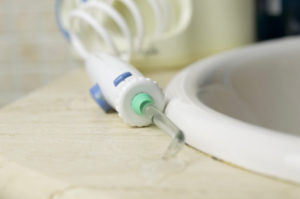
You’ve heard about water flossing and have probably seen a water flosser or two at the store. It likely left you wondering, “How do water flossers work?” You’re not alone. Water flossing isn’t new, but it has recently gained in popularity. We’ll dive into it and answer your most pressing questions.
What Is a Water Flosser?
A water flosser is a special device used to spray a stream of water around and between teeth. This dental health machine consists of a motor with a pump, a water reservoir, and a water flosser tip. The motor and pump move water from the reservoir out through the tip to produce a pressurized stream of water. You hold the water flosser tip and direct this stream of water around your mouth.
How Do Water Flossers Work and How Do You Use Them?
The water flosser is designed to remove plaque with water pressure rather than scrape the teeth as you would do with regular dental floss. Water flossers purport to massage the gums and remove food and debris from hard to reach places in your teeth.
If you’re wondering how to gracefully shoot a stream of water into your mouth without making a mess, the truth is it can be a little tricky. There’s a learning curve and things can get a little messy in the interim. More than likely, you’ll shoot water across the bathroom at least once.
However, knowing a few tips and tricks can help you use a water flosser more effectively. Start by filling the reservoir with lukewarm water. These next two steps are the most important for avoiding a soggy bathroom:
- First, place the tip of the water flosser in your mouth before turning it on
- Then, lean over the sink. You’ll be slowly letting the water dribble from your mouth throughout the process
Close your mouth enough that the water won’t be splashing out everywhere, but you can still move the water flosser around your mouth easily. From there, you’re ready to turn your water flosser on.
Start on the lowest setting as you get used to using your water flosser. When the water starts flowing, aim the tip at your gum line on your back teeth. Then, begin working your way down your gums and between your teeth. You’ll proceed this way until you’ve water flossed your entire mouth, including the inside and outside of your upper and lower teeth.
Do Water Flossers Work as Well as Regular Flossing?
So the big question is: Do water flossers work as well as dental floss? Unfortunately, the answer is no. Dental floss works by scraping up and down the teeth to remove plaque. Because a water flosser cannot scrape in the same way, it can’t remove plaque in the same way either. Unless you absolutely cannot use regular dental floss due to dental restorations or because of problems with your hands—like arthritis or a tremor—that make regular flossing difficult, a water flosser is not a replacement for regular flossing with dental floss.
However, a water flosser can be an excellent addition to your oral health routine if you struggle with regular flossing. If you are interested in using a water flosser to improve your oral hygiene, talk to your dentist about additional tips.
When to Use a Water Flosser
When regular flossing proves difficult, a water flosser may be a great solution. A water flosser can be a particularly helpful tool for people with certain dental restoration work. People with dental implants, permanent bridge work, crowns, or braces often find flossing with dental floss to be difficult. That doesn’t mean it’s impossible and shouldn’t be attempted. Here, the water flosser could offer some additional benefit. Because this tool is able to easily navigate around the dental restoration and hardware in your mouth, accessing hard to reach areas can be significantly easier with this tool.
People with pockets in their gum tissue from gum disease or with teeth so tightly spaced that they cannot reliably get floss between them may also benefit from using a water flosser. Since the water can get into those spaces that may be inaccessible with floss, a water flosser can offer a more effective solution.
In addition, a water flosser can help people who have trouble handling and maneuvering regular dental floss properly. If arthritis, stroke, traumatic brain injury, or a nervous system or neurological disorder make it hard for you to hold or use floss effectively, a water flosser may help make cleaning between your teeth and along your gums easier.
How to Decide: Do Water Flossers Work for You?
The best way to decide whether a water flosser is going to work for you is to think about your regular oral hygiene routine. Do you currently use dental floss regularly, or do you end up skipping flossing because it’s too difficult? A water flosser is not a replacement for regular dental floss. If you currently floss regularly and without difficulty, a water flosser is probably unnecessary. However, if you frequently skip flossing, for whatever reason, it’s possible that adding a water flosser could benefit you. Next, think about what you’re actually willing to do regularly. If you added a water flosser step to your dental health routine, would you really use it? Or are you more likely to be successful with regular dental floss? Ideally, you’d stick with flossing daily with regular dental floss, but if you’re already skipping that step, consider whether you’d be more willing to use a water flosser, in spite of the drawbacks.
Finally, talk to your dentist about whether adding a water flosser would benefit your oral health. Dental professionals recommend maintaining excellent oral health for a variety of reasons. Obviously, maintaining healthy and shiny teeth is ideal, but your oral health extends way beyond your mouth. As dental expert Dr. Kami Hoss points out in his upcoming book, If Your Mouth Could Talk, your oral health can significantly impact the rest of your body. In fact, it’s been found that higher levels of gum disease can correlate with other severe illnesses. Ultimately, maintaining your oral health is an important part of maintaining your overall health. If a water flosser helps you maintain consistent oral hygiene, your dentist is likely all for it.
Sources:
https://www.mouthhealthy.org/en/az-topics/w/water-flossers
https://www.healthline.com/health/dental-and-oral-health/waterpik-vs-flossing
https://www.webmd.com/oral-health/what-is-waterpik
https://www.ninds.nih.gov/Disorders/Patient-Caregiver-Education/Fact-Sheets/Tremor-Fact-Sheet
https://www.medicalnewstoday.com/articles/315992#Water%20picking
https://www.mayoclinic.org/healthy-lifestyle/adult-health/expert-answers/dental-floss/faq-20058112
https://www.deardoctor.com/inside-the-magazine/issue-34/oral-hygiene-for-fixed-bridgework/
https://www.waterpik.com/oral-health/how-to-floss/
https://www.waterpik.com/oral-health/buying-guide/what-is-a-water-flosser/

